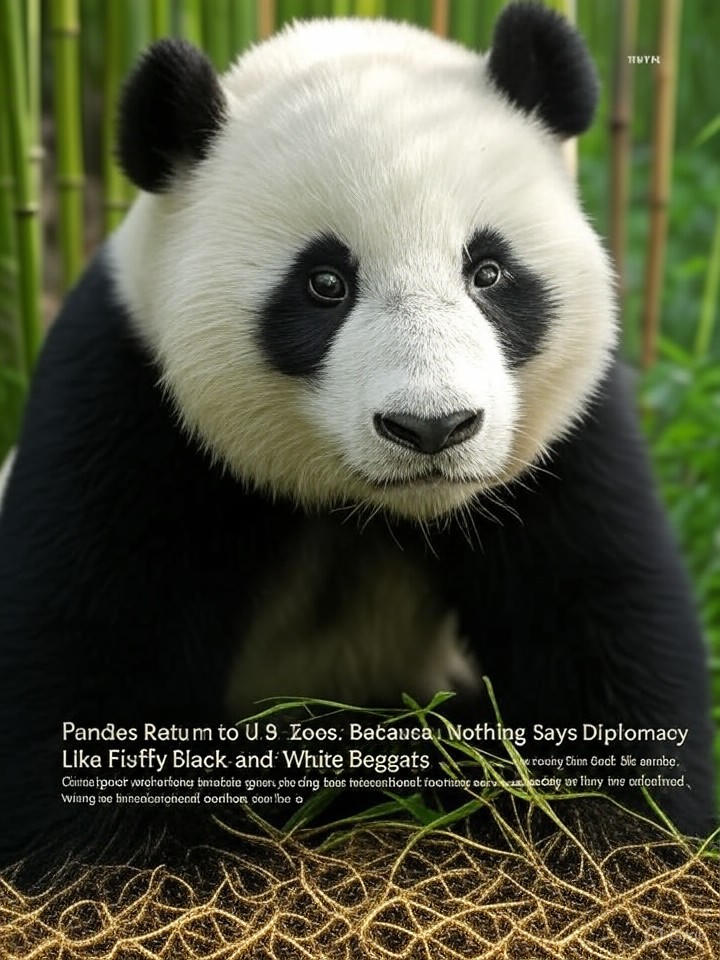In a move that's equal parts adorable and strategically ambiguous, China has decided to lend a paw—or rather, a pair of pandas—to American zoos once again. After a brief hiatus that left animal lovers bereft and diplomats scratching their heads, the black-and-white furballs are back, ready to munch bamboo and melt hearts while subtly reminding everyone who's got the upper hand in global trade talks. It's panda diplomacy 2.0, folks, where the stakes are high, but the envoys are low-maintenance vegetarians.
Let's rewind: Panda loans have been China's go-to soft power play since the 1970s, when Nixon got a couple as a thank-you for not being a total jerk about Taiwan. Fast-forward to today, and with tensions simmering over tariffs, tech bans, and TikTok, Beijing is dusting off its cutest weapons. The San Diego Zoo and possibly others are set to welcome these roly-poly ambassadors, complete with million-dollar annual rental fees that make your Netflix subscription look like chump change. Because nothing says 'let's be friends' like charging rent on endangered species.
But why pandas? Why not something more ferocious, like tigers or those grumpy sun bears that went viral for looking like dudes in costumes? Simple: Pandas are the ultimate diplomats—lazy, non-confrontational, and experts at looking cute while doing absolutely nothing productive. They spend 12 hours a day eating and the rest napping, which is basically the animal kingdom's version of a UN peacekeeping mission. Plus, their black-and-white color scheme is a not-so-subtle nod to the binary world of international politics: You're either with us or against us, but hey, look at the baby panda!
American zoo officials are over the moon, or at least pretending to be while they scramble to build enclosures that could double as luxury spas. 'We're thrilled to have these icons back,' said one anonymous zookeeper, probably while calculating how many bamboo shipments it'll take to keep the beasts from staging a hunger strike. Visitors are already lining up, eager to snap selfies with creatures that embody the fragile state of U.S.-China relations—one wrong move, and poof, the pandas get recalled faster than a faulty iPhone.
Critics, however, are less enthused. Animal rights groups argue that shipping pandas around like diplomatic FedEx packages isn't exactly humane, while economists point out that the real cost includes not just the lease but also the inevitable spike in plush toy sales. And let's not forget the pandas themselves—who knows if they even want to be here? Imagine being yanked from your misty mountain home to stare at screaming kids through plexiglass. It's like being an unwilling celebrity on a reality show called 'Survivor: Zoo Edition.'
On the political front, this fluffy gesture comes amid a backdrop of thorny issues, from semiconductor squabbles to South China Sea shenanigans. Is it a genuine olive branch, or just a way to distract from the fact that both sides are still playing economic chicken? Experts say it's both—pandas are the carrot, while tariffs are the stick. Or in this case, the bamboo stalk versus the trade embargo.
Meanwhile, social media is abuzz with memes comparing the pandas to various politicians: 'As ineffective as Congress but way cuter!' one tweet quipped. Conservationists hope the renewed attention will boost efforts to save the species, which numbers around 1,800 in the wild—fewer than the number of times we've almost started World War III over apps and balloons.
In the end, whether this panda ploy leads to warmer relations or just more zoo revenue remains to be seen. But one thing's for sure: In the game of thrones that is global diplomacy, sometimes the best move is to send in the clowns—or in this case, the cuddly, bamboo-chomping ones. Here's hoping these black-and-white beggars can bridge divides that even the sharpest negotiators can't.

